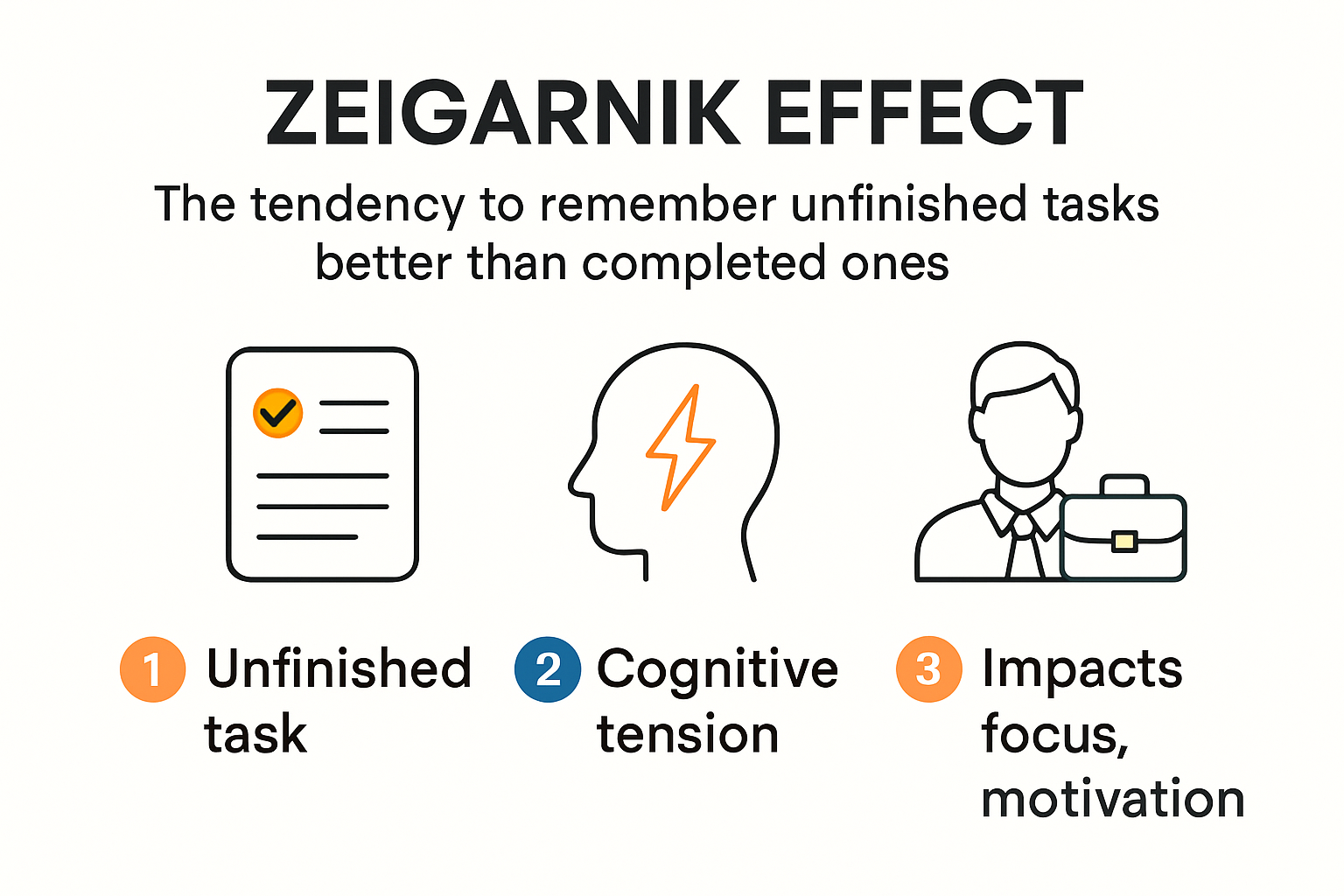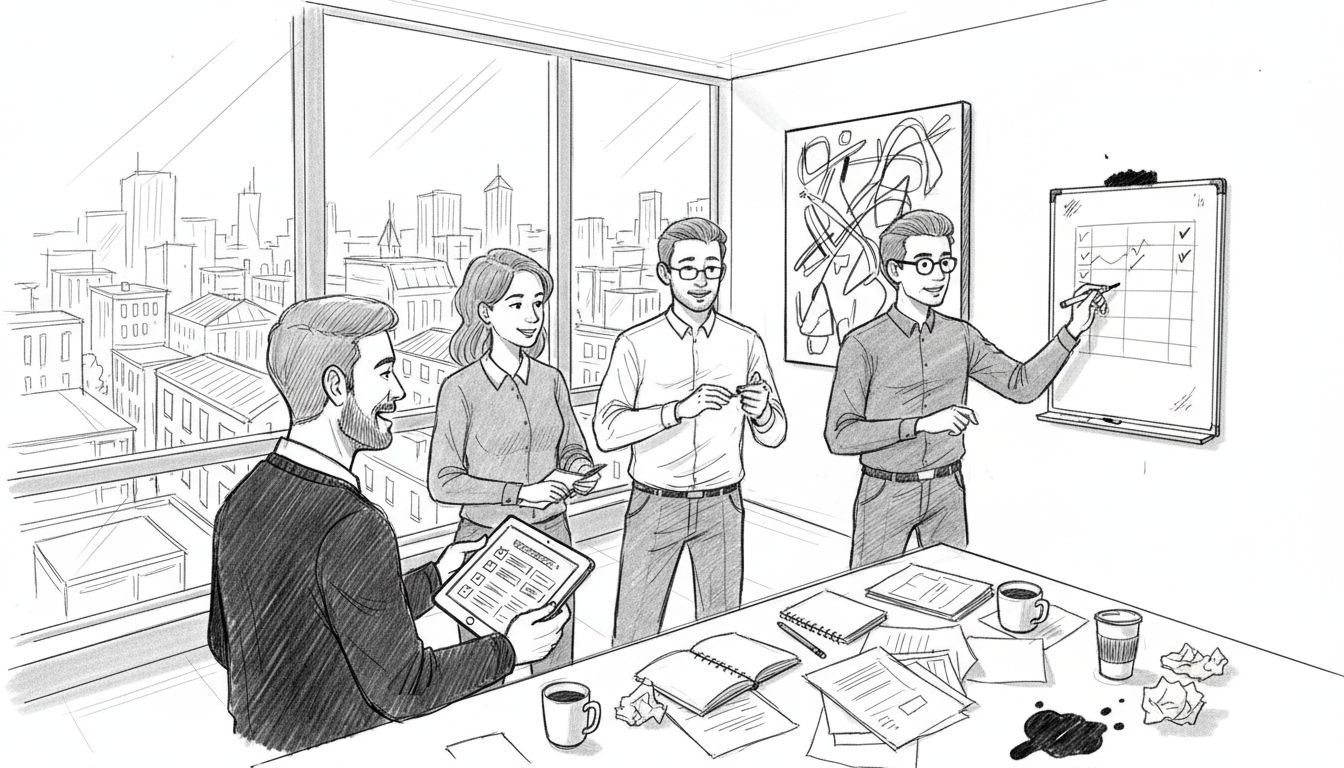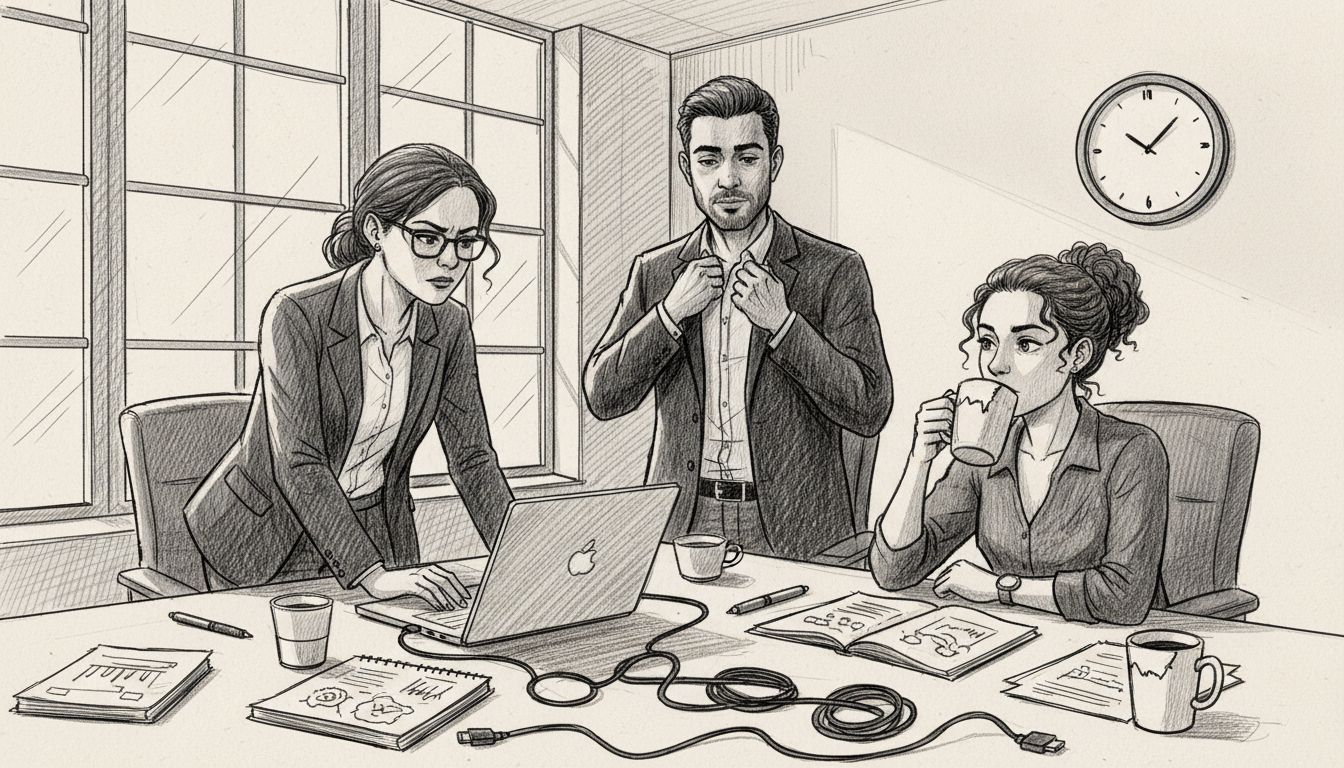Every manager wants their team to be more productive, but the real secret might be hiding in all those unfinished to-dos. Turns out, people remember incomplete tasks up to 90 percent better than finished ones. Most companies rush to close open projects, thinking that closure keeps everyone focused. In reality, those loose ends might be the engine that drives your team’s next breakthrough.
Table of Contents
- What Is The Zeigarnik Effect In The Workplace?
- Why Unfinished Tasks Drive Team Performance
- Practical Ways To Apply The Zeigarnik Effect
- Common Pitfalls And How To Avoid Them
Quick Summary
| Takeaway | Explanation |
|---|---|
| Leverage Task Incompletion | Recognize that unfinished tasks create cognitive tension, which can be utilized as a motivational tool to boost team performance. |
| Use Progress Visualization | Implement visual indicators such as progress bars and milestone trackers to help employees see their incremental advancements, triggering their psychological drive for closure. |
| Incorporate Gamification | Introduce game-like elements such as rewards and levels to maintain engagement and transform cognitive tension into a persistent motivational force. |
| Implement Reminder Systems | Design contextually sensitive and personalized reminder systems to gently prompt team members about pending tasks without creating overwhelming stress. |
| Balance Motivation and Mental Health | Develop support frameworks that consider individual stress tolerance and provide resources to manage cognitive load, ensuring that motivation does not compromise mental well-being. |
What Is the Zeigarnik Effect in the Workplace?
The Zeigarnik Effect represents a fascinating psychological phenomenon that significantly impacts workplace dynamics and individual performance. Named after Soviet psychologist Bluma Zeigarnik, this cognitive mechanism describes how unfinished tasks create a persistent mental tension that keeps individuals mentally engaged and more likely to remember incomplete work compared to completed tasks.

The Psychological Mechanism Behind Task Incompletion
At its core, the Zeigarnik Effect emerges from a unique cognitive process where our brains generate a psychological discomfort when tasks remain unresolved. Research from the Journal of Experimental Psychology reveals that humans have an intrinsic psychological drive to complete what they start. This underlying mechanism creates a form of mental tension that acts as a cognitive bookmark, keeping unfinished tasks at the forefront of our mental processing.
When employees experience multiple incomplete tasks, their brain generates a persistent signal of incompleteness. According to PsychCentral’s research, this cognitive tension can lead to increased stress levels and potentially impact mental health. The continuous mental processing of unfinished work can create a cycle of cognitive overload, making it challenging for workers to fully disengage from professional responsibilities.
Impact on Workplace Performance and Mental Well-being
In professional environments, the Zeigarnik Effect can manifest as both a potential motivator and a source of psychological strain. People First UK research suggests that unfinished tasks can significantly disrupt work-life balance, causing employees to carry mental baggage from incomplete projects into their personal time. This persistent cognitive load can reduce an individual’s ability to relax and recover from workplace stress.
Team leaders and managers can strategically leverage the Zeigarnik Effect by understanding its psychological underpinnings. By creating structured environments that recognize task incompletion and provide clear pathways for resolution, organizations can transform this cognitive mechanism from a potential stressor into a productivity catalyst. The key lies in designing workflow systems that acknowledge the psychological need for task completion while preventing overwhelming mental burden.
Ultimately, the Zeigarnik Effect offers profound insights into human cognitive processes. By recognizing how unfinished tasks create psychological tension, businesses can develop more empathetic, supportive work environments that respect the complex interplay between task management and mental well-being. The goal is not to eliminate task incompletion but to create frameworks that help employees navigate and resolve their professional responsibilities more effectively.
To provide a clearer overview of the dual nature of the Zeigarnik Effect in the workplace, the following table summarizes its positive and negative impacts as described in this section.
| Positive Impact | Negative Impact |
|---|---|
| Enhances memory for unfinished tasks | Increases stress levels |
| Creates cognitive motivation and engagement | Can lead to work-life imbalance |
| Drives persistence to complete work | Promotes cognitive overload when unmanaged |
| Encourages focus on unresolved tasks | Reduces ability to disengage from work |
Why Unfinished Tasks Drive Team Performance
The power of unfinished tasks extends far beyond mere psychological curiosity. Teams can strategically harness the Zeigarnik Effect to transform workplace productivity and motivation. By understanding how incomplete tasks generate cognitive momentum, organizations can create more dynamic and engaging work environments.
Cognitive Tension as a Performance Catalyst
Research from Zimbardo Psychological Institute reveals that unfinished tasks create a unique form of psychological motivation. When team members are confronted with incomplete work, their brain enters a state of heightened focus and anticipation. This cognitive tension acts as an internal driving force, compelling individuals to return to and complete their tasks.
The strategic breakdown of projects into smaller, intentionally incomplete segments can maintain employee engagement at a remarkably high level. Strategy Table’s research demonstrates that this approach triggers a continuous mental processing mechanism. Employees become more committed to their work, experiencing an intrinsic desire to close the mental loops created by unfinished assignments.
Breaking Project Complexities into Motivational Segments
Wikipedia’s psychological research highlights that the human brain is naturally wired to seek closure. By deliberately structuring work processes that leave subtle gaps or milestones, managers can tap into this fundamental psychological driver. This approach transforms potential workplace frustration into a powerful performance enhancement strategy.
The key lies in creating a balanced workflow where tasks are challenging yet not overwhelming. When teams experience a series of near-completion moments, their motivation remains consistently high. This technique prevents mental fatigue while maintaining an ongoing sense of progress and anticipation.
Interestingly, the Zeigarnik Effect also serves as a natural memory enhancement mechanism. Unfinished tasks remain more prominent in an individual’s memory compared to completed ones. This means that by strategically managing task incompletion, teams can improve information retention, boost long-term project awareness, and maintain collective focus on complex organizational objectives.
Leaders who understand and implement this psychological principle can create more adaptive, responsive work environments. The goal is not to perpetually keep tasks incomplete but to design workflow structures that leverage the natural human tendency to seek resolution. By transforming cognitive tension into a performance-driving mechanism, organizations can unlock unprecedented levels of team engagement and productivity.

Practical Ways to Apply the Zeigarnik Effect
Transforming psychological insights into actionable workplace strategies requires thoughtful implementation of the Zeigarnik Effect. Teams can leverage this cognitive mechanism to enhance productivity, maintain engagement, and create more dynamic work environments.
Progress Visualization and Task Tracking
LogRocket’s UX Design Research demonstrates that visual progress indicators can significantly amplify team motivation. By implementing progress bars, step counters, and milestone trackers, organizations create tangible representations of task incompletion that naturally trigger employees’ psychological drive to achieve closure.
Effective progress visualization goes beyond simple tracking. It transforms the abstract concept of task completion into a compelling visual narrative. When team members can see their incremental advancements, the Zeigarnik Effect generates a powerful intrinsic motivation. Each partially completed segment becomes a cognitive prompt, encouraging continued effort and engagement.
Gamification and Task Management Strategies
Gamification offers a sophisticated approach to applying the Zeigarnik Effect in professional settings. Gamification Research reveals that introducing game-like elements such as levels, badges, and incremental challenges can dramatically increase task persistence. By breaking complex projects into smaller, strategically incomplete segments, teams can maintain heightened psychological engagement.
Consider implementing reward systems that acknowledge partial progress. These systems might include digital badges for reaching specific milestones, point accumulation for task progression, or team recognition for maintaining consistent workflow momentum. Such approaches tap directly into the psychological mechanism of cognitive tension, transforming potential workplace stress into a motivational tool.
Strategic Reminder and Notification Systems
Productivity Research indicates that well-designed reminder systems can leverage the Zeigarnik Effect to re-engage team members with pending tasks. Intelligent notification strategies that highlight incomplete work without inducing overwhelming stress can serve as gentle cognitive triggers.
The most effective reminder systems are contextually sensitive and personalized. They provide just enough information to reactivate the mental bookmark of an unfinished task without creating additional psychological pressure. This might involve sending targeted notifications that remind employees of specific incomplete tasks, highlighting potential next steps, or providing quick access to partially completed work.
Implementing the Zeigarnik Effect requires a nuanced approach. The goal is not to create constant psychological tension but to design work environments that respect human cognitive processes. By understanding how unfinished tasks generate motivation, leaders can create more adaptive, responsive, and psychologically informed workplace systems that naturally drive performance and engagement.
For readers looking to assess the practical methods for applying the Zeigarnik Effect discussed above, here’s a summary table outlining each method and its primary benefits.
| Method | Primary Benefit |
|---|---|
| Progress Visualization | Makes incremental progress visible and motivating |
| Gamification | Enhances engagement through rewards and challenges |
| Reminder Systems | Re-engages teams without overwhelming stress |
| Task Breakdown into Segments | Maintains ongoing cognitive motivation |
| Reward Partial Progress | Drives persistence through frequent reinforcement |
Common Pitfalls and How to Avoid Them
While the Zeigarnik Effect can be a powerful productivity tool, improper implementation can lead to significant workplace challenges. Understanding potential risks and developing strategic mitigation approaches is crucial for leaders seeking to harness this psychological phenomenon effectively.
Cognitive Overload and Mental Stress Management
Strategy Table research reveals that unchecked task incompletion can generate substantial psychological strain. When teams are confronted with too many unfinished tasks, the cognitive tension transforms from a motivational mechanism into a significant source of workplace stress. This transition occurs when the number of incomplete tasks exceeds an individual’s cognitive processing capacity.
To prevent cognitive overload, organizations must implement deliberate task management strategies. This involves creating clear prioritization frameworks that help employees distinguish between critical unfinished tasks and those that can be temporarily set aside. Establishing realistic workload expectations and providing regular opportunities for task resolution can help maintain a healthy balance between motivation and mental well-being.
Preventing Productivity Paralysis
Zimbardo Psychological Institute warns that excessive focus on task incompletion can lead to productivity paralysis. When team members become too fixated on unfinished work, they may experience decision fatigue and reduced action-taking capabilities. This psychological state can create a counterproductive cycle where the anxiety surrounding incomplete tasks prevents actual task completion.
Mitigating this risk requires a structured approach to task management. Leaders should encourage breaking complex projects into smaller, achievable segments. By creating clear, measurable milestones and providing supportive feedback mechanisms, teams can maintain forward momentum without becoming overwhelmed by the cognitive burden of incomplete work.
Balancing Psychological Motivation and Mental Health
The most sophisticated approach to leveraging the Zeigarnik Effect involves maintaining a delicate psychological balance. While cognitive tension can drive performance, prolonged exposure to unresolved tasks can negatively impact mental health. Organizations must develop nuanced strategies that recognize individual differences in stress tolerance and cognitive processing.
Implementing robust support systems is critical. This might include regular check-ins, mental health resources, and flexible work arrangements that allow employees to manage their cognitive load effectively. The goal is to transform the Zeigarnik Effect from a potential stressor into a constructive performance enhancement mechanism.
Successful implementation requires ongoing adaptation and sensitivity to team dynamics. By understanding the complex interplay between task incompletion, psychological motivation, and individual well-being, leaders can create work environments that harness the Zeigarnik Effect’s potential while protecting employee mental health. The most effective strategies will be those that view task management as a holistic, human-centered process rather than a purely mechanical workflow.
Frequently Asked Questions
What is the Zeigarnik Effect?
The Zeigarnik Effect is a psychological phenomenon where people remember unfinished tasks better than completed ones, creating a mental tension that drives motivation to complete those tasks.
How can the Zeigarnik Effect boost team performance?
By strategically leveraging unfinished tasks, organizations can enhance cognitive motivation and engagement among team members, resulting in improved productivity and focus on unresolved work.
What strategies can be used to apply the Zeigarnik Effect in the workplace?
Effective strategies include progress visualization, gamification, personalized reminder systems, and breaking down projects into smaller, intentionally incomplete segments to maintain motivation and engagement.
What are the potential pitfalls of using the Zeigarnik Effect?
While useful, potential pitfalls include cognitive overload, productivity paralysis, and negative impacts on mental health. It’s essential to manage task incompletion to prevent excessive stress and maintain a healthy work-life balance.
Ready to Turn Cognitive Tension Into Real Productivity Gains?
You just learned how the Zeigarnik Effect can sharpen your team’s focus by leveraging open tasks and visual progress. But while unfinished work can spark motivation, it can also overwhelm teams and eat into personal time if left unmanaged. Gammatica is designed to help you capture the benefits of this psychological edge—without risking burnout or cognitive overload.

Bring structure to your workflow and close your productivity gaps. Let Gammatica’s AI-driven task management tools highlight open items, automate reminders, and split big projects into clear actionable segments. Visualize progress, prevent overload, and save up to 16 hours each week with smart automation and intuitive dashboards. Discover how your team can stay engaged and organized while keeping mental stress in check. Visit Gammatica.com today and see how easy it is to unlock team performance using proven psychological principles.



